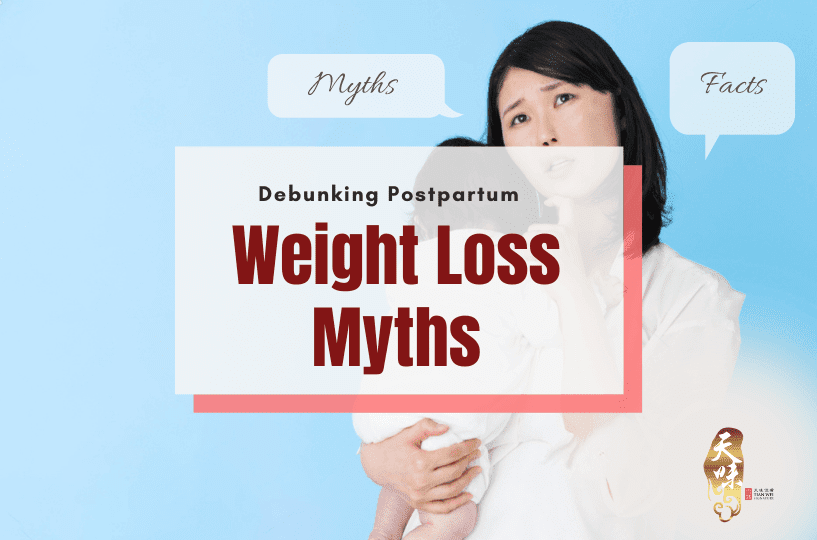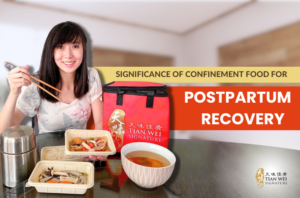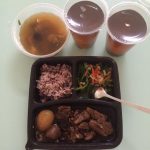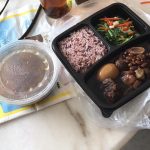81 Tagore Lane, TAG A, #01-11 Singapore 787502 ♦ Reservation : +65 6727 5599
Debunking 4 Myths Around Postpartum Weight Loss

It’s natural to wonder how you’ll lose the “baby pounds” after your precious little one arrives. That almost always brings us to the question: “How do you reach a healthy body weight postpartum?”
You start with having good information, of course. Having the right information is essential to a gradual and healthy postpartum weight loss, which is said to help you keep the weight off better than when you try to lose weight quickly using shortcuts.
Unfortunately, there are as many myths as there are tips on how to lose pregnancy weight. We realise that new mothers already have a lot on their plates, from taking care of their newborns to settling into a new routine and recovering from childbirth. So, it is rather impractical to throw the task of separating the rights from the wrongs into the mix.
So, we decided to do it for you! Here are four of the most common postpartum weight loss myths debunked for the benefit of all new mothers.
1. Fad & Crash Diets
Myth: “A detox diet, green diet, or no-carb diet will help you to snap back in no time.”
Fact:
Crash and fad diets do not help. The pounds you lose from crash diets are temporary and may cause you to lose muscle mass and too many fluids, which can be detrimental to your health. Fad diets, on the other hand, do more harm than good. It increases the risk of nutrient deficiencies, reduces energy levels, affects postpartum recovery and slows down metabolism, which makes it even harder to lose weight.
Fix:
Balanced meals packed with nutrient-rich foods and reasonable portions are the best way to go about your diet. A balanced diet should include the following nutrients – whole-grain carbohydrates, high-quality proteins, healthy fats, vitamins, and minerals. The basic rule is to follow the quarter, quarter half plate concept, in which a quarter of your plate is a protein choice, another quarter of the plate is a staple of choice and the remaining half of your plate is vegetables. If you’re still unsure, perhaps you could give our dietitian-reviewed confinement food trial a go. This way, you’ll know what a proper, balanced meal should look and taste like.
2. Breastfeeding
Myth: “Breastfeeding makes the baby’s weight fall right off.”
Fact:
Breastfeeding does help you melt off the baby’s pounds. However, it is more complex than it sounds. Breastfeeding can burn up to 500 calories a day, but only if you’re taking in your recommended amount of calories each day and breastfeeding exclusively.
Fix:
First, make sure you’re eating a well-balanced and healthy diet. Limiting deep-fried oily foods, incorporating whole grains and taking adequate fruits and vegetables in every meal will naturally help you to keep yourself under recommended calories and nutrient intake. High fibre from fruits, vegetables and whole grains will also provide bulk in your meal that would help to provide satiety quickly.
Secondly, since breastfeeding burns up to 500 calories per day (for mothers who breastfeed), you are highly encouraged to breastfeed your baby for up to 6 months exclusively. Incorporating galactagogues like ginger, garlic, and fenugreek seeds into your meals can help boost your milk supply. However, finding the time to prepare the proper meal with the right lactogenic foods can be difficult. Fortunately, all our confinement meal plan dishes include some of Asia’s most well-known galactagogues! There’s your fix, mommies.
Bonus tip: MumChecked offers some of the best-rated breastfeeding essentials designed to make the process of breastfeeding easier, especially for first-time mothers in Singapore. Be sure to go check them out!
3. Skipping Meals
Myth: “Skipping meals and snacks can help you lose weight quicker.”
Fact:
Skipping meals is unsustainable in the long term. It does not cultivate good eating habits and a healthy relationship with food. When you skip meals, your body gets tricked into “starvation mode”. This may cause your body to tend to store energy more efficiently than burning calories. Simultaneously, you will tend to crave and snack more in between meals as your main meals do not provide sufficient energy throughout the day, in turn resulting in overall total calorie intake possibly being more than without skipping meals. Another theory of how skipping meals can do more harm than good is that it would encourage drastically lower energy intake which may cause your body to lose lean body mass as it breaks down proteins in our muscles to produce energy. Lower lean body mass not only reduces your basal metabolic rate but in severe cases, it can lead to weakness, easy fatigue and a higher risk of malnourishment.
Fix:
Be sure to eat three meals a day regularly. If you want to switch things up, try eating smaller, frequent meals throughout the day. As for snacking, a good tip is to stock up on some yummy yet healthy snacks, such as oatmeal, mixed nuts, fruits, or herbal soups like our Chinese confinement soup. Oh, we’ve heard that lactation bakes make great snacks too! Be sure to go check out these delicious munchies.
4. Exercising

Myth: “Exercising is not possible with a new baby around.”
Fact:
It is true that newborns require lots of care and attention, which can take up most of your time and energy. However, you can find the time to exercise in many different ways, even with a baby around. Starting small and simple exercises such as strolls in the park will benefit your health. Being active regularly preserves your muscle mass and strength but will also help regulate your metabolism, energy levels and stamina. The secret is to include your baby in your workouts!
Fix:
You can put your baby in a stroller and go on simple walks around the block. Going on a 30 to 45-minute walk three to five times a week can help you gain your fitness back, and promote quicker overall recovery and mental healthYou can also exercise at home by watching videos or online routines. Besides exercising while watching your baby, you can pause and tend to your baby as needed. You can even include your baby directly in your workouts with exercises like reverse baby curls, push-ups, etc.
Reminder: Ensure you’ve gotten the green light from your doctor before you start exercising, and never push yourself into a more challenging routine or too high of intensity for faster weight loss. Remember, your body is still recovering after birth.
So, How To Lose Postpartum Weight Faster The Healthy Way?
The desire to snap back into shape like you used to is natural, and if it’s for all the right reasons, we should support mothers during this journey so that mothers lose weight gradually and healthily.
It is important to note that 3 to 4 kg of fat gained during pregnancy is important and natural for the body to do so to ensure that it has energy stores to produce breast milk. The body stores these fats in case of any food shortage, a necessary evolutionary adaptation.
One thing we can celebrate is that women who frequently breastfeed throughout the day and sustain breastfeeding for 9 months or longer tend to retain or gain more muscle mass with weight loss compared to women who nurse infrequently and for a shorter duration.
Overall, breastfeeding mothers may lose weight faster and return to pre-pregnancy weights at a faster rate than their non-breastfeeding counterparts. So, if you can breastfeed, breastfeed! As you walk into your journey to lose weight after giving birth, keep in mind 5 different focuses.
5 Focuses
#1 Focus on fully recovering
It is imperative that mothers should focus on eating well to get better first. Bleeding during the first week is common whether you give birth vaginally or through cesarean section. There is the discharge of lochia, expelling of the placenta, and the uterus contracting back to a smaller size. Your body is trying to achieve electrolyte balance in the body that does not hold a baby anymore. Many mothers may also have wounds that need to heal. Thus, aggressive movements should be avoided. Extreme dieting during this period should be avoided, and lack of nutrition will only delay recovery and wound healing. The confinement food menu in Singapore tries to nourish foods during confinement to support mothers through the recovery process.
#2 Focus on breastfeeding
Breastfeeding is usually encouraged within the first hour after giving birth. Babies are encouraged to latch on and suckle on the breast. For some mothers, breast milk is available even during the 3rd trimester. For other mothers, breast milk only comes with stimulation at the breast by the baby. The more the baby nurses, the more breast milk will be produced by the body. Thus, eating well to support your body in recovery while breastfeeding is essential. Without eating well, to feel exhausted easily. In severe cases, inadequate dietary intake may also lead to lesser breast milk production. Thus, it’s essential to eat well and not be busy cutting calories to lose weight. You can take comfort in knowing that without calorie restrictions of exercise, generally, breastfeeding women tend to lose weight more rapidly than their non-breastfeeding counterparts up to 6 months postpartum.
#3 Focus on cooking methods
Calories matter when it comes to fat loss or gain, but that does not mean you have to count your calories. Many other ways exist to create a calorie deficit and improve your diet. Firstly it’s by looking at the different cooking methods. Cooking methods that use less fat would mean fewer calories. Thus, cooking methods like steaming, boiling, light stir fry or baking can be a lower calorie option to do as often as possible. Another method is limiting sauces and gravies, which are much higher in calories. If you are a person that likes your meals wet, instead of pouring gravies over your rice, you can pour herbal or clear soups instead.
#4 Focus on food choices
Other methods to keep overall calories lower include water and zero-calorie drinks such as plain tea, plain coffee, or zero-sugar carbonated drinks. During meal times, you should prioritise protein as protein will keep you full longer. Yes, adding more vegetables will help create more bulk without many calories to your meal so that you can achieve satiety, but it may not sustain you throughout the day. Adequate protein is vital. Eating less will not help your body build lean muscle mass as you lose weight. An average woman would need roughly 60 to 70g of protein daily, depending on her fitness goals and physical activity.
#5 Focus on being active
When your doctor gives you the green light to be physically active, you should try to move. You can start with just walking and having light stretches. As soon as you are ready, gradually increase the intensity as your body recovers and strengthens. Aim for 150 to 300 minutes of moderate-intensity aerobic activity per week and muscle strengthening exercises twice weekly at moderate to vigorous intensity. There are clear benefits to being active after pregnancy, such as improved mental health, bone density, reduced stress level, and better weight management. High-intensity exercises can increase lactic acid concentration in breast milk, but there are no side effects to the milk supply or the quality. A healthy weight loss rate is not more than 0.5 to 1kg per week. More than 1kg per week of weight loss is not recommended in breastfeeding mothers.
Conclusion

All in all, mummies who are healthy and happy will be able to attend to their babies well! So, do not hesitate to reach out to your friends and family whenever you need help during this journey of motherhood.
All of us would like to see you succeed and enjoy motherhood. We want to be a community that supports mothers to be the best they can be for their little ones and their families.
The best confinement meals in Singapore are the ones that support you in recovering well during confinement. Chinese confinement food provides traditional dietary aspects, which some mothers may prefer. So long it’s balanced, and you’re taking sufficient vegetables, staples, and protein every day, such a meal can support you to recover well too.







